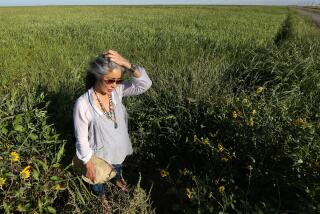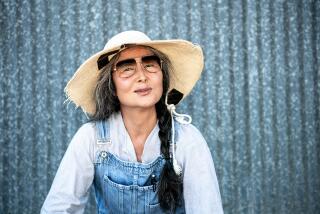Farmer Who Stood Ground Dies
- Share via
Hiroshi Fujishige, the proud and determined farmer who for 20 years refused Walt Disney Co.’s multimillion-dollar offers for his 56-acre strawberry farm in Anaheim, has died at the age of 76.
Family members said he died of natural causes after suffering a brain injury several months ago.
Fujishige, the son of Japanese immigrants, became a folk hero for successfully battling the mammoth entertainment company that wanted to develop his property. In August, after Fujishige’s injury, the family had finally decided to sell the land, purchased for $3,500 and now worth as much as $90 million.
By all accounts, Fujishige was a widely respected man who upheld a longtime family agricultural tradition despite tremendous pressure to sell.
“He was a wonderful human being who loved his land and deeply cared about people,” Anaheim City Manager James D. Ruth said Tuesday. “Here are a lot of great examples that a lot of us could follow in terms of his basic values. He will certainly be missed.”
Former Anaheim Councilman Irv Pickler said, “We’ve lost a man whose integrity . . . was more important than money. I admire the fact that he stood his ground and the family knew what they wanted to do. I wish we had a little more of that today.”
Fujishige was known for his humility and for finding the time to mentor longtime employees at the farm, who considered him a father figure.
“I began working for him when I was 16 years old, and he always treated me like a son,” said Pancho Contreras, who worked for Fujishige for 19 years. “If you ever saw my boss, you would never know that he was a wealthy man. He was one of the most humble and simple men I’ve ever known. I don’t think I will ever work for another like him. I will miss him very much.”
Born on July 17, 1922, to Hisao Fujishige and Ayano Mizunaga in Los Angeles, Hiroshi seemed destined to live a life on the farm. Hiroshi and his younger brother, Masao, helped their parents harvest the fields of their Los Angeles farm until their life was disrupted by World War II.
Like many Japanese-Americans, the Fujishiges left California to avoid internment and migrated to Utah, where the two brothers grew up. When the war ended, the family returned to California.
They settled in Anaheim in 1954, shortly before Disneyland opened. That event turned a sleepy farming town of eucalyptus trees and orange groves into one of the prime tourist destinations in Southern California.
Offers to the Fujishiges from developers, Disney and the city soon were pouring in. Sometimes the would-be buyers cajoled and tried to coax the family into giving up the land. Other times, the corporations played hardball, resorting to lawsuits and threats. But the brothers stood firm, steadfastly refusing to give up their property.
“They had their own vision for that land, and that is what America is all about,” Ruth said.
In 1985, the city of Anaheim took the family to court, trying to force them to allow developers to expand a road through the farm as part of a plan for a high-rise hotel. But that action was dropped when the hotel deal collapsed.
In 1986, tragedy struck the family with the death of Masao Fujishige, who shot himself in the head.
Rumors circulated that pressure from the city had driven Masao to take his own life. But Hiroshi went before the City Council as a peacemaker. He told officials that they should not feel guilty and that his brother’s failing health had led to his death.
Pickler, a councilman at the time, recalled that occasion Tuesday and said of the elder Fujishige brother: “I always thought the world of this man. He wanted to let me know that it was not true. I just felt so pleased that he had the consideration to come and do that.”
In February this year, Hiroshi Fujishige fell in the bathtub, sending him into a coma, relatives said. Six months later, his relatives decided to sell the farm.
An intensely private family, the Fujishiges never discussed the reasons for their change of heart. But some who knew the family said they felt the time had come to move ahead.
Disney and Anaheim officials were elated with the decision, saying that the land was much too valuable to remain in agriculture. But even people who had pushed hard to persuade Hiroshi Fujishige to cash in on the land respected his unwavering stand through the decades.
“We have the highest respect and regard for the Fujishige family, and we are very saddened to hear of the death of Hiroshi Fujishige,” said Ray Gomez, director of communications for Disneyland. “Our thoughts and deepest condolences go out to the family.”
Hiroshi Fujishige is survived by his wife, Reiko, 64; and children Nancy, 23; Jane, 33; and Jack, 29, who has been running the family business while on leave from doctoral studies at UC Irvine.
More to Read
Sign up for Essential California
The most important California stories and recommendations in your inbox every morning.
You may occasionally receive promotional content from the Los Angeles Times.










